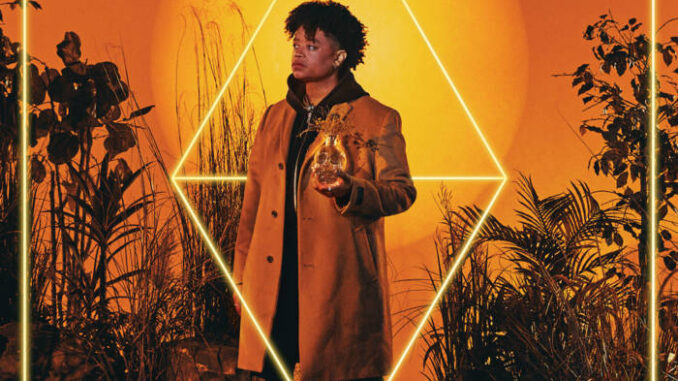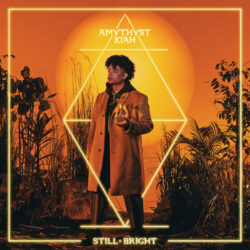
Amythyst Kiah emerges from the dark of “Wary + Strange” to brighter things on stunning new ‘cinematic’ album.
 Amythyst Kiah , a formidable Grammy-winning singer-songwriter, hails from Chattanooga, Tennessee, although now living in Johnson City. Her award in 2020 was for her song ‘Black Myself’‘, espousing her own ethnicity as a black girl being brought up in a largely white part of the city, and the exacerbated struggles of being a lesbian as well – “I wanna jump the fence / and wash my face in the creek / But I’m black myself / I wanna sweep that gal right off her feet / But I’m black myself”. The song was originally written for her collaborative album “Songs of Our Native Daughters” (with Alison Russell, Rhiannon Giddens and Leyla McCalla, all formidable artists).
Amythyst Kiah , a formidable Grammy-winning singer-songwriter, hails from Chattanooga, Tennessee, although now living in Johnson City. Her award in 2020 was for her song ‘Black Myself’‘, espousing her own ethnicity as a black girl being brought up in a largely white part of the city, and the exacerbated struggles of being a lesbian as well – “I wanna jump the fence / and wash my face in the creek / But I’m black myself / I wanna sweep that gal right off her feet / But I’m black myself”. The song was originally written for her collaborative album “Songs of Our Native Daughters” (with Alison Russell, Rhiannon Giddens and Leyla McCalla, all formidable artists).
These themes formed the foundation of her wonderful second album “Wary + Strange“, a cathartic experience also dealing with the suicide of her mother when she was 17 years old ( she is now in her mid-thirties) and the effect her grief had on her life. In a generally downbeat album, the songs were almost uniformly highly melodic, even though dealing with the issues above plus depression and alcoholism. That album certainly alerted the listening world to Amythyst Kiah, on an album that developed the sounds of her earlier outings which were largely folk and more acoustically arranged.
Her new album “Still + Bright” is a step forward emotionally and temperamentally as can be gleaned from the title, not to mention the production (by Butch Walker) which is even more experimental than previously (with grungy guitars and nods to indie rock, but contained with the Americana definition with plenty of acoustic guitars, mandolin and fiddle, though not necessarily as you might have expected to hear them). And there is a new openness in sharing the songwriting credits and the inclusion of special guests, more of whom a bit later. The uncertainty of “Wary + Strange” gives way to a more optimistic Kiah, partly demonstrated by the power of her voice over and above the encompassing sound of the brilliant session players – the go-to multi-string instrumental ace Ellen Angelico is nothing short of amazing, Tania Elizabeth on fiddle adds some very fine contributions (especially on ‘S P A C E’ and ‘Dead Stars’), the rhythm section comprises the dynamic Matty Alger on drums and Walker on bass.
The album kicks off with the very punchy ‘Play God and Destroy the World’, featuring the first of her guests, S G Goodman on powerful vocals and a tantalising chorus. Inspired by a love of the movie The Matrix, the song (co-written by The 400 Unit’s Sadler Vaden) looks back at Kiah’s younger self. The second track ‘S P A C E‘ is a kind of soul-folk track with a Gospelly feel driven largely by fiddle, mandolin and Kiah’s own banjo.
‘Empire of Love’ is a real standout, a great tune, and according to Kiah, a personal theme (and another co-write, this time with Sean McConnell) about her faith and her belief in the natural world. This has got tinkly keys over raunchy guitars courtesy of Butch Walker, and soaring steel in the background. ‘I Will Not Go Down’ is also an absolute stunner. Written with Butch Walker, this thumping track features several guitars over Kiah’s banjo, including an amazing blast of acoustic genius from guitar wizz Billy Strings. It has a bit of a world music feel and speaks to the barbarism of past wars when “people believed they were serving their God, but in fact it was only for their warmongering lords”. The rocking ‘Silk and Petals‘ (tremendous drumming from Alger and featuring Butch Walker on vocals) is a ghost story of sorts, with Kiah reinventing the story of the Lady in the Lake with the idea of “ghosts being unable to leave this realm because they’re hanging onto something they’ve lost”. ‘Die Slowly Without Complaint is a co-write with Avi Kaplan who lends his deep voice on alternate verses on a funky country blues. ‘Gods Under the Mountain’ continues the funky blues tempo, where Kiah teams up lyrically with Sean McConnell again, with Ellen Angelico excelling on dobro and pedal steel as background rather then front and centre country instruments.
The whole album is driven by Kiah’s interest In ‘historical stories and philosophy. As Kiah relates further “Lots of the songs are inspired by the cosmos, space, meditation, and mindfulness. It’s a way to piece out what it means to be a human being in the modern world”.
‘Dead Stars’ is a bit of a relief after two heavy tracks, being a country waltz with Tania Elizabeth’s fiddle being a standout, with Kiah’s singing probably the best on the album, being quite diverse. Further on ‘Let’s See Ourselves Out’ is a much more laid-back track with acoustic guitar and mandolin as lead instruments with Willy Nelson’s harmonica player Mickey Raphael laying some haunting sounds in the background. ‘Never Alone’ is another highlight and one of the cornerstones of the album, Kiah warning people that always believing that you are in the right and others are wrong risks a doom-laden scenario, and to what end? “I don’t know if there’s an answer / I don’t think I see a sign / If you think the world revolves around you / You’ll just get left behind / You’re never alone”. It’s another pounding roots rocker driven by screeching quasi-psychedelic guitars and fiddle underpinned by Alger’s drums and Walker’s bass. The closer ‘People’s Prayer’ is a co-write with Rancid’s Tim Armstrong, with a plea to “hang on for dear life until it’s over”.
And therein lies the difference with “Wary + Strange” – despite all the gloomy histories and philosophies, this is an album reflecting her liberation from the events that resulted in the earlier album and notwithstanding some internal confusion in the last three tracks, the whole album underlines and provides an understanding of the album’s title, i.e “Still + Bright”.
Amythyst Kiah digs very deep, expanding her musical space, opening up her songwriting process, displaying a greater vocal range and delivering a very personal message – it’s a remarkable and powerful album.


